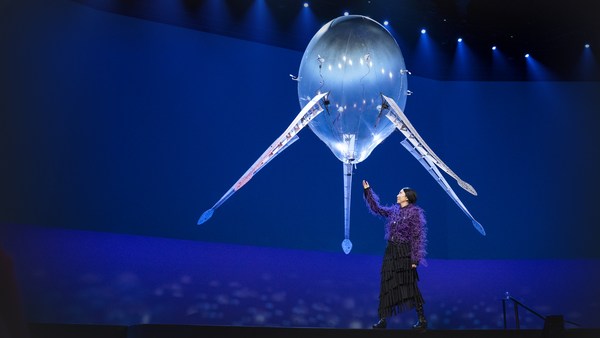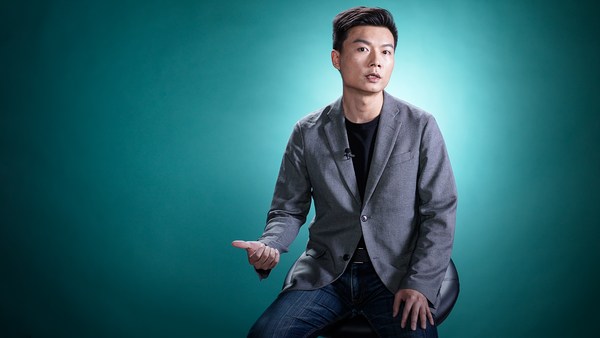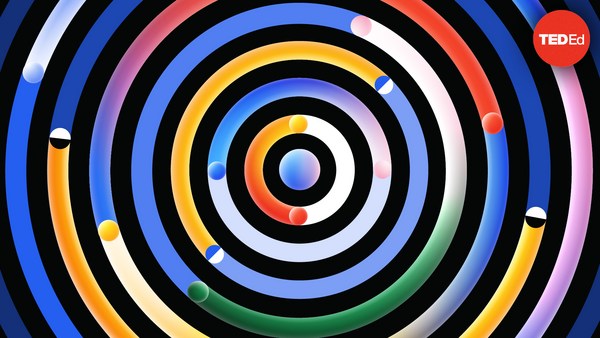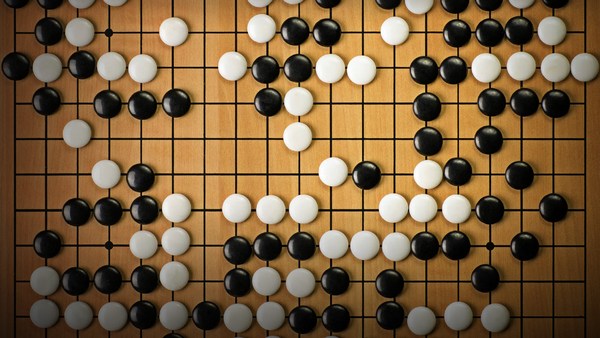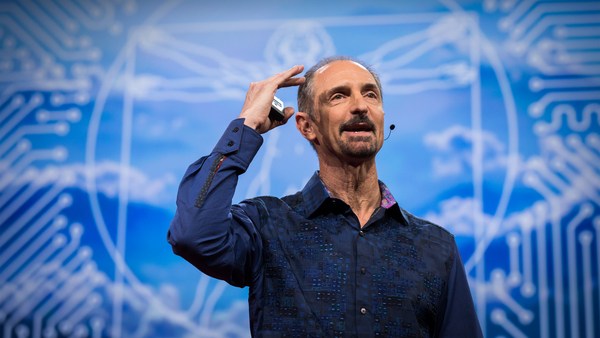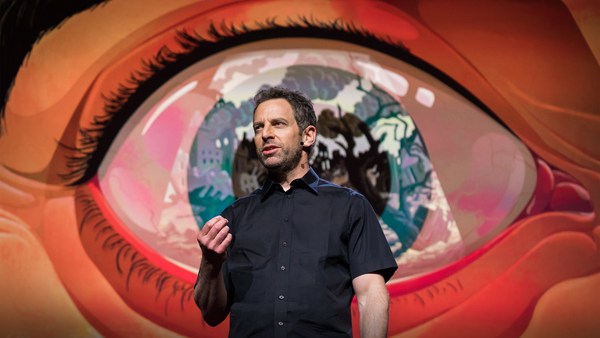Here's what gives me hope for humanity. I believe that we can change our human nature for the better. This chance is unique. It's where we stand in history right now. No other generation has stood here before us.
Homo sapiens has been around for about 300,000 years. Other humanoid life forms have come and gone. We find their traces. We search for their stories. But we are the success story. We've survived natural disasters, famines, floods, earthquakes, plagues, woolly mammoths, mess-ups of our own making. We're smart, no question. The question is: Are we smart enough to survive how smart we are? It's not looking so good just now, is it?
(Laughter)
We stand facing the possibility of global conflict. If that happens, it will be our Third World War in not much more than 100 years. If Putin's violence stops today, the problem doesn't go away. As across the globe dictatorism threatens democracy. I wonder whether as a species we can survive any of this, even if those threats disappear. Those living inside the snow globe of their magical thinking will not be insulated against the facts of climate breakdown. And yet, still, we go on heating up the planet. Still we go on polluting the earth. Still we despoil our precious natural resources.
250 years ago, we kick-started the Industrial Revolution. The machine age. It's when we first hear the buzzwords of the modern moment. Disruption, acceleration. That's Karl Marx, actually. Acceleration of production, the factory system, acceleration of transport, the coming of the railways. No need for ships to wait for the wind. Coal-fired, steam-powered. Acceleration of information. The global village. And it's when we start digging fossil fuels out of the ground in planet-changing quantities, when we start pushing carbon dioxide into the atmosphere.
In a salami slice of space-time, human beings have changed the way that we live on the planet forever. We've moved out of the agricultural economies of our evolutionary inheritance into the industrial economies and beyond of where we are now. There's no one else for us to turn to. There's no one else for us to blame. There is no us and them. There's only us. So will we continue to be the success story of the known universe, or are we writing our own obituary? The suicide species?
Now I was raised in an evangelical household. We lived in end time. We were waiting for things to get so bad that Jesus would come back and save us. The apocalypse. It's what the prepper communities are, well, prepping for. And it's why super rich white guys are buying up tracts of land, hoping that they can live inside a kind of wi-fi-enabled Noah's Ark.
(Laughter)
Well, we can have the end time if we want it. We know those stories from our religions, our sci-fi, our movies. We are uniquely placed to bring on the apocalypse. And we're uniquely placed to save ourselves, too. If we could accept that as a species, Homo sapiens needs to evolve further. And that's what gives me hope, because we have the means to evolve further. And that's AI.
Now look, I don't mean the geeks will inherit the earth. I'm sorry, geeks. You won't.
(Laughter)
I don’t really want to talk about narrow- goal artificial intelligence at all. That term of John McCarthy’s, “artificial intelligence,” is it any use to us now? I'd rather call it alternative intelligence. And I think humankind is in need of some alternative intelligence.
In 1965, Jack Good talked about AI as our last invention. He meant superintelligence, the kind of thing that worries Bill Gates and Elon Musk. You know, the "Terminator" scenario. The final us and them. But I think that's all to do with our doomster mindset. We don't have to vote for the apocalypse.
Jack Good worked at Bletchley Park with Alan Turing during World War II, building the early computing machinery that would crack the Nazi Enigma code. Now after the war, Turing, wrestling with the problems of a stored, programmed computer had a bigger dream on his mind. And in 1950, Alan Turing published a paper called “Computing Machinery and Intelligence.” And in there, there's a chapter that's titled "Lady Lovelace's Objection" where Turing time-travels back 100 years to have a conversation with that long-dead genius, Ada Lovelace, the first person to write mathematical programs for the computer not yet built by her friend Charles Babbage. Now Ada wrote that as well as doing awesome stuff with numbers, the computer would, if correctly programmed, be able to write novels and compose music. That is a pretty big insight in 1843.
"But," said Ada, "The computer should never have any pretensions to originate anything." She meant, think creatively. Well, Ada's father was Lord Byron, England's most famous poet, and England is the land of Shakespeare. More poets. And Ada had seen Charles Babbage's kit all over the floor, and she wasn’t having some steampunk, coal-fired nuts, bolts, bezels, levers, gears, cogs and chains, crank-handled machine writing poetry.
"Well," said Alan Turing, "Was Lady Lovelace, correct? Could a computer ever be said to originate anything? And what would be the difference between computing intelligence and human intelligence?"
Well, I'll tell you one difference, and it's optimistic. Computing power uses binary, but computing intelligence is nonbinary. It's humans who are obsessed with false binaries. Male, female. Masculine, feminine. Black, white. Human, non-human. Us, them. AI has no skin color. AI has no race, no gender, no faith in a sky God. AI is not interested in men being superior to women, in white folks being smarter than people of color. Straight, gay, gay, trans are not separating categories for AI. AI does not distinguish between success and failure by gold bars, yachts and Ferraris. AI is not motivated by fame and fortune. If we develop alternative intelligence, it will be Buddhist in its non-needs.
(Applause)
Now I am aware that the algorithms ubiquitous in everyday life are racist, sexist, gendered, trivializing, stoke division, amplify bias. But what is this teaching us about ourselves? AI is a tool. We are the ones who are using the tool. Hatred and contempt, money and power are human agendas, not AI agendas. We've been forced to recognize the paucity, the inadequacy of our data sets. And humans are trained on data sets too. We've had to recognized the unacknowledged ideologies that we live by every day. Rationality, neutrality, logic, objective decision-making. What can we say about any of that when we see what we are reflected back to us in the small screen? And it's not a pretty sight. AI is not yet self-aware. But we are becoming more self-aware as we work with AI and we realize that Homo sapiens is no longer fit for purpose. We need a reboot. So what are we going to choose? Apocalypse or an alternative?
I believe that humans have a strong future as a hybrid species as we start to merge with the biotechnology we're creating, whether that's nanobots in the bloodstream, monitoring our vital systems, whether it's genetic editing, whether it's 3D printing of bespoke body parts, whether it’s neural implants that will connect us directly to the web and to one another, insourcing information, enhancing our cognitive capacities. And if we manage to upload consciousness, I think that the shift from the transhuman to the posthuman world will seem natural, an evolutionary necessity.
Why do I say that? I say that because for millennia, all human beings have been obsessed with the big question, the absurdity of death. We asked, "Do we have souls?" We watched the spirit wait to leave the body. We created the world's first disruptive startup, the afterlife.
(Laughter)
Now a multinational company, with a vast VR real estate portfolio. A mansion in the sky, sir? Our earliest extant written narrative, The Epic of Gilgamesh, is a journey to discover if there is life after death. And what is life after death? It is the extension of the self beyond biological limits.
Now I’m a writer, and I wonder, have we been telling the story backwards? Did we know we would always get here, capable of creating the kind of superintelligence that we said created us? We're told were made in God's image. God is immortal. God is not a biological entity.
Since the 17th century, the Enlightenment, science and religion have parted company. And science said, all that God thinking, the afterlife stuff, it's folly, It's ignorance, it's superstition. Suppose it was intuition. Suppose it was the only way we could talk about what we knew, a fundamental, deep truth that this is not the last word. This is not the end of the story. That we are not time-bound creatures caught in our bodies. That there is further to go. I'm fascinated that computing, science and religion, like parallel lines that do meet in space, are now asking the same question: Is consciousness obliged to materiality?
Now ... I accept that machine intelligence will challenge human intelligence. But the mythos of the world is built around a group of stories that showcase an encounter between a human and a nonhuman entity. Think of Jacob wrestling the angel. Think of Prometheus bringing fire down from the gods. In these encounters, both parties are changed, not always for the better. But it generally works out. We've been thinking about this stuff forever. It's time that we created it. And we could have some fun stuff too. Who wants their own AI angel? Me.
There's a message in a bottle about this 200 years ago. When Ada Lovelace was busy getting born, her father, Lord Byron, was on holiday on Lake Geneva with his friend, the poet Percy Shelley, and Shelley's wife, Mary Shelley. On a wet weekend with no internet Byron said --
(Laughter)
"Let's write horror stories." You know what happened. Out of that came the world's most famous monster, Frankenstein. This is 1816, the start of the Industrial Revolution. Mary Shelley is just 19 years old. In that novel, there is an alternative intelligence made out of the body parts from the graveyard and electricity. An astonishing vision because electricity was not in any practical use at all and was hardly understood as a force. You know what happens. The monster is not named. Not educated. Is outcast by his panicky creator, Victor Frankenstein. And the whole thing ends in a chase across the Arctic ice towards a Götterdämmerung of death and destruction. The death wish that human beings are so drawn to, perhaps because it's easier to give up than to carry on.
Well, we're the first generation who can read Mary Shelley's novel in the right way, as a flare flung across time, because we too could create an alternative intelligence, not out of the body parts from the graveyard using electricity, but out of zeros and ones of code. And how is this going to end? Utopia or dystopia? It's up to us. Endings are not set in stone. We change the story because we are the story.
Now, Marvin Minsky called alternative intelligence our "mind children." Could we as proud parents accept that the new generation that we will create will be smarter than we are? And could we accept that the new generation we create need not be on a substrate made of meat?
Thank you.
(Applause)
Thank you.
Thank you very much. Thank you.
Thank you.
Helen Walters: Jeanette, stay right there. I have some questions.
Jeanette Winterson: I know you want your lunch. Me too.
(Laughter)
HW: No. Everybody, stop. OK. That was amazing. Thank you. What would you say our odds were of survival?
JW: Look --
(Laughter)
I'm an optimist. I’m a glass-half-full girl. So I know that we’re running out of time, time is the most precious resource we have, and there isn't much of it. If we get this right soon, it can really work. If we get it wrong, will be fighting each other with sticks and stones for scraps of food and water on an overheated planet in the ruins of dictator-world.
But --
(Laughter)
OK. But we could get it right. That’s why I feel we’ve arrived at this moment before, and it might disappear back into space-time. Then we'll have to wait billions of years to get here again, which is so dull.
So let's not fuck it up.
(Laughter)
(Applause)
HW: I've got another question. I just wanted to have a moment of eye to eye. Don't fuck it up. Don't fuck it up. OK.
JW: That’s the message. The whole TED Talk is: “Don’t fuck it up.”
HW: But wait, I have another question.
JW: I could have saved 12 minutes, 55 seconds.
HW: Yeah, well, I'll just be the title that we put online.
Jeanette Winterson: “Don’t fuck it up.”
OK. I want to talk about love. So in your memoir, which everybody should read, it is called “Why Be Happy When You Can Be Normal?” The very end of that book is about -- it’s a good title -- t’s about love. And you write, "Love, the difficult word. Where everything starts, where we always return. Love. Love's lack. The possibility of love." Now I don't want to bastardize Ada Lovelace. She was all about originating. But what about love? What about alternative intelligence and love?
JW: We'll teach it.
HW: We’ll teach it? JW: Yeah. And listen, any of you who ever fell in love with your teddy bear, which is all of you, know what it's like to have an intense relationship with a nonbiological lifeform.
(Laughter)
HW: Jeanette Winterson, I love you.
JW: Thank you. HW: Thank you so much. Thank you.
